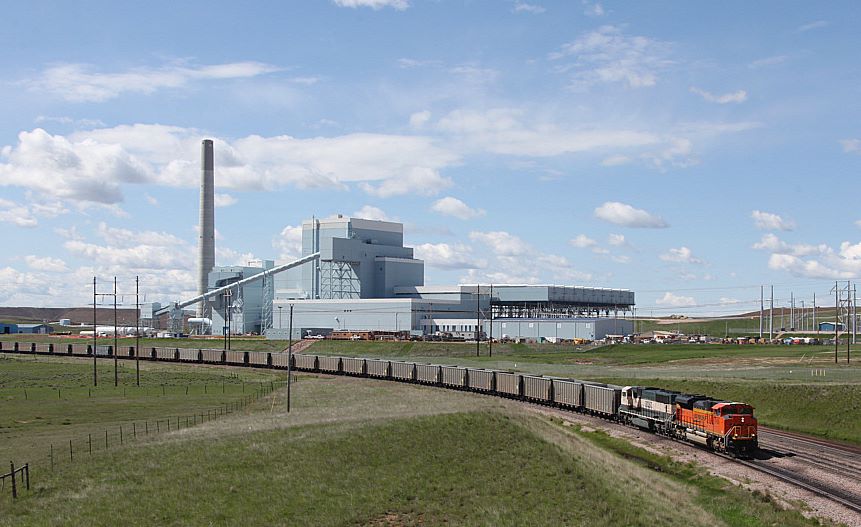Integrated Test Center Welcomes Two Carbon Capture Projects

By Mary Stroka
May 5, 2023 - Gilette, Wyojming business leaders celebrated the launch of two carbon capture projects May 2 in a private groundbreaking ceremony at the Integrated Test Center.
The carbon capture and utilization testing facility at Basin Electric Power Cooperative‘s Dry Fork Station, which is located at 1460 N. Highway 59, allows carbon capture technology developers access to scrubbed flue gas that would otherwise be released from the plant. The University of Wyoming School of Energy Resources is the Integrated Test Center’s administrator. The state spent $15 million to construct and operate the facility. Basin Electric provides engineers and construction management services.
The two projects involve three companies.

Wyoming Integrated Test Center
Japan Carbon Frontier Organization, or JCOAL, and Kawasaki Heavy Industries’ carbon capture project will test Kawasaki’s novel solid sorbent technology.
The State of Wyoming and JCOAL signed a memorandum of understanding in 2016 to cooperate in coal research and develop technologies and coal trade, a news release from JCOAL said. Japan’s Ministry of the Environment commissioned the project, which tests how effective and useful the technology and solid sorbent are before the companies deploy the technology commercially via larger plants. Because sustainable climate change actions and energy security are crucial, the companies will focus on promoting zero-CO2-emissions technologies for coal utilization, not coal phase-out.
Since coal supports power generation, steel, cement and the chemical industry, JCOAL wants to achieve carbon neutrality, which means reducing CO2 emissions to net zero while using coal as a resource and energy source, the Integrated Test Center release said.
Kawasaki Heavy Industries’ sorbent uses a lower-grade heat than conventional, amine-based solvent systems require, so the company’s carbon capture system is more efficient and uses less energy than other available systems, JCOAL’s release said.
Membrane Technology and Research will use the Integrated Test Center’s large test bay for its membrane carbon capture technology project, which is part of the U.S. Department of Energy’s large-scale pilot carbon capture funding opportunity, a news release from the company said.
Membrane Technology and Research Carbon Capture is working on membrane-based carbon capture technology to prepare a clean capture solution for power and industrial facilities.
Membrane Technology and Research Carbon Capture President Brett Andrews said the groundbreaking follows 15 years of research, development and testing to produce clean capture technology.
“Once built, the 150-tonne/day Large Pilot will be the largest non-solvent–based capture plant in the world, and it represents our final step toward commercial deployment,” he said.
The Integrated Test Center’s project portfolio has more than $100 million in carbon capture and carbon utilization technology deployment, according to the Wyoming Integrated Test Center’s release.
Wyoming Gov. Mark Gordon said in the release that he’s unwavering in his commitment to using Wyoming’s resources to ensure coal remains a viable, reliable fuel for the next generation through CO2 capture.
“Partnerships such as these with Japan and the DOE underscore the global leadership Wyoming has to offer regarding transitioning traditional energy development through the reduction of carbon emissions,” he said.
Basin Electric Power Cooperative CEO and General Manager Todd Telesz said his company is proud to help advance carbon capture, utilization and storage efforts and find out how to reduce carbon while still using coal and having responsible, reliable operation of its units.
ITC Managing Director Jason Begger said the center’s been working with the two developers since 2019 as they’ve advanced their projects toward large-scale testing, the release said.
He told County 17 at the groundbreaking that he anticipates the project teams will choose to use local contractors, including Gillette engineering and construction companies that Basin Electric has approved.
“The real goal in all of this, though, is to find those technologies that allow these coal plants to stay open longer and longer, which keeps the trains running and keeps the mines mining and those folks employed because you really know the large economic impact that those coal mines have,” he said.
Begger said that by the time the projects reached this stage, they were ready to deploy at scale, and through developing business relationships, the test center determined that the two projects were the right fit.
“We’re kind of the graduate school for carbon capture projects,” he said.
Campbell County Chamber of Commerce Executive Director and Energy Capital Economic Development Board Member Gail Lofing said that it’s exciting to see the projects come to fruition. Seven years ago, she was on site first meeting with IT professionals.
“And here we are, ready to work on this and ready to get it going,” she said.
Energy Capital Economic Development VP of Operations Mike Shober said he believes these are the first of many of these types of projects to come, whether they are carbon capture, carbon-to-products or coal-to-products.
“It’s an exciting time to be in Campbell County, to be in Gillette,” he said.
Integrated Test Center operations manager Jim Ford said the groundbreaking represents the opening of a new chapter at the center.
“It’s really exciting,” he said. “It’s been a long wait. This really gives substance to the fact that the state of Wyoming, Powder River Basin and even Gillette are going to continue to play a tremendously outsized role in continuing to power the nation like we have for the last 50 years. There’s just new demands placed on our energy industries to lower carbon intensity, and we’re doing it. … This will be one more block in the foundation of a strong, vibrant energy economy.”
Kawasaki Heavy Industries begins construction this week with a target to be operational this fall, Ford said. Membrane Technology and Research is starting construction within the next month and seeks to be operational in the second quarter of 2024.

